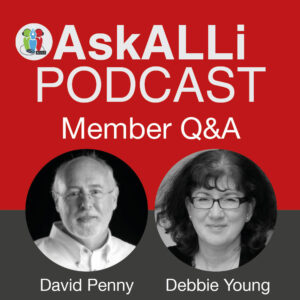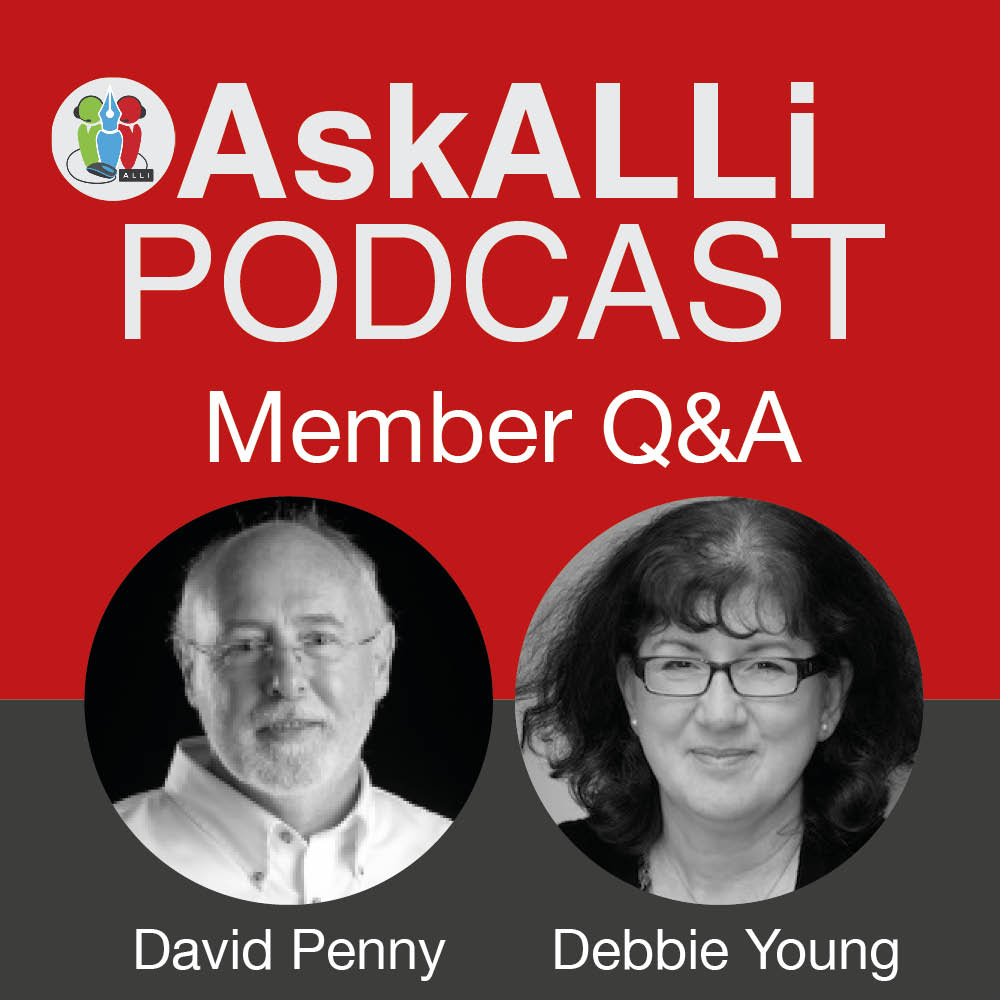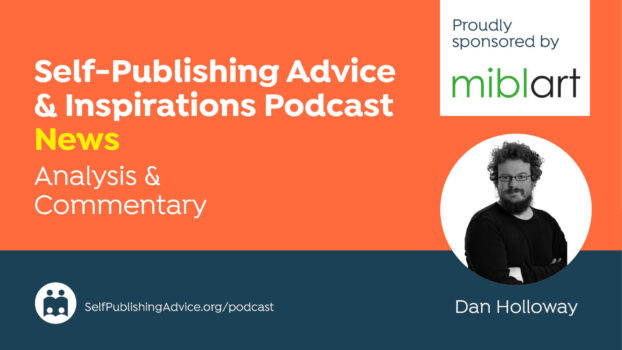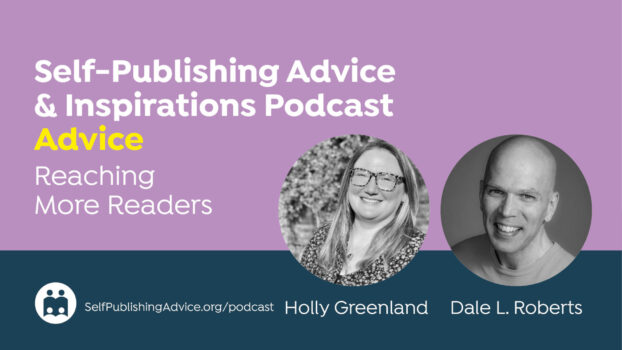 Each month David Penny and Debbie Young are in the indie author hot seat to answer the most pressing questions from our ALLi members. Between them they have a wealth of self-publishing experience to share, and both love nothing more than sharing their advice and experience with other indie authors just like you, so that you are prepared and ready to travel along the self-publishing path to success.
Each month David Penny and Debbie Young are in the indie author hot seat to answer the most pressing questions from our ALLi members. Between them they have a wealth of self-publishing experience to share, and both love nothing more than sharing their advice and experience with other indie authors just like you, so that you are prepared and ready to travel along the self-publishing path to success.
Even though only members can submit questions, the broadcast is accessible to everyone to learn from. Join us each month to listen to the podcast, watch the broadcast recording, or read the full transcript.
Summary of our Ask ALLi Self-Publishing Member Q&A Topics:
- Q: How do I stop my margins jumping about when formatting my book in Word?
- Q: How do you position your book in the marketplace when rebranding and relaunching the 2nd edition version?
- Q: How do you choose your categories when your book is in a narrow niche?
- Q: How do you market a book if you want to use a pseudonym?
- Q: Should I use a paid service called Indie Book Reviewers website?
- Q: I find Facebook Ads daunting, are there simple resources and instructions available?
Listen to our Self-Publishing Q&A Podcast on Libsyn
[podcastsubscribe]Watch our Self-Publishing Q&A Broadcast on YouTube
Click here to subscribe to our YouTube Channel
Read our Self-Publishing Q&A Broadcast on YouTube
Debbie: Hello, welcome everybody, to the first ALLi podcast of the new year. I’m Debbie Young and this is David Penny [hello], and we’re here to answer questions that have been sent over the Christmas period and a little bit before, since our previous podcast. All sorts of questions, covering mostly aspects of marketing and promotion this time, actually. If you’ve got any questions until the next time, save them up and send them over next time and we’ll get through as many as we can. And today, we’re going to kick off with some questions about production issues and setting your book up for effective marketing as you put it out there, to the public.
Q: How do I stop my margins jumping about when formatting my book in Word?
Now, we had an interesting question from a very nice lady called Fiona Fraser-Thompson who has in fact solved her problem since she asked about it. But what was happening was that her margins were jumping about when she was formatting her book. And she wasn’t having much luck with this and ended up having some assistance from her very kind editor to sort her out. But this is a really common problem, especially when you’re first starting out. And the best thing to do is to really master whatever program you’re working and do a bit of a practice run and get used to the way that it actually works.
I format my books in word, the interiors in word and there are a few strategic things that will make all the difference to whether you can do it successfully or not. First point is to use word’s built in styles where you can set up various kinds of styles for things like titles, chapter headings, indented paragraphs, undented paragraphs, all that sort of thing, you set those up to suit yourself and then you apply those styles to all the different parts of the book as you go through.
The other thing that you need to master is the section breaks which helps you get the page breaks in the right place and get the page numbering. It drives you bonkers when you first try to do it but the good news is that every time you do another book, it gets a little bit easier and as with anything, you learn by doing. And as Fiona has found out, so, well done Fiona for conquering that.
Dave, you use something different don’t you, when writing your books?
David: I do, I still finish up with the document in word but in effect, it could be any text editor but it has to be a word doc. And I use a piece of software called Vellum, which isn’t free. It is a paid for piece of software but in my opinion if you’re going to be producing a whole set of novels, or short stories or whatever, it’s well worth the investment. It’s about $120 for the e-book version and maybe another $100 to do print versions. But basically, it will import an entire word document. It will recognize all the chapters and it will actually number them correctly, even if you have them wrong in your word doc.
Debbie: That’s just witchcraft really, isn’t it? That’s just fantastic.
David: Yes, my current whip, I deleted a chapter and I left, so it went from chapter 27 to 29. And I imported into Vellum and it said oh don’t be silly, and it went 27, 28, 29. So, I’ve now got one chapter left till the end. And it just does it beautifully and it does a print book as well. So, if, as Fiona was brave enough to state, she is a total technophobe and there’s nothing wrong with that at all. A lot of writers are. Something like Vellum or maybe some other paid service is a great way to go because if you don’t like the technology, then concentrate on what you do love doing and what you’re good at and write great books and allow somebody else or a piece of software to do the formatting for you.
Debbie: Yeah.
David: Oh, and one thing Debbie forgot to mention is that you may notice that this is a totally different layout to normal because my internet is not working. So, I’m actually sitting in Debbie’s lovely little office.
Debbie: Yeah, it’s where it all happens.
David: It’s a beautiful Cotswold’s village and we’re sitting side by side to do this today.
Debbie: And very cozy it is too.
David: It is.
Debbie: So, yeah, so, that’s great. All of those formatting issues we’ve got, and those different programs, if you want to know more about them, we’ve got posts on formatting e-books and print books with word and also on formatting books with Vellum, all over on the ALLi blog. Which is www.selfpublishingadvice.org. So, if you just go and put the key words in the search engine, you’ll find those really useful posts.
Q: How do you position your book in the marketplace when rebranding and relaunching the 2nd edition version?
So, having solved that problem, moving on to how to position your book in the market place. And we’ve got two different questions on different aspects of positioning your book in the market in the right place. And we’ve got, first one question from JP, about branding?
David: Yeah, he points out that he’s doing a re-branding, sorry, it’s a question about [mumbles], sorry. He wants to pre-launch his books and he’s re-branded them completely and he wants to make sure that they are different, or that they’re differentiated from his previous books.
Debbie: Yeah, so it’s a second edition, effectively.
David: It is, it is.
Debbie: With new titles, covers, new ISBN’s, everything. A complete spring clean and revamp of the books so, well done JP because that’s a brave decision. It’s not an easy decision. And it can make a big difference to the success of a book, as you found when you changed your covers, didn’t you, David?
David: Yeah, I changed my covers because there was no consistency. It’s a series and there was no consistency between books 1, 2 and 3. They were good covers but they didn’t say this is the third book of the series, where as now they do.
Debbie: And they’re much more specific about the genre as well aren’t they, very clearly at a glance.
David: Yeah, your cover has to tell, like Debbie’s fantastic cozy mysteries set in the Cotswold’s, they do scream that this is exactly what you are going to be getting. And that’s exactly what your covers must do, yeah.
Debbie: Yeah. But when you do a re-launch like that, it’s really important, particularly if you’ve got a big, established readership who are out there poised to grab your next book, you want to make sure, as JP is concerned, that they don’t see your new title and think oh, haven’t read that one yet, let me order that, download it or buy the paperback and find out actually, it’s a book they read under a different guise already. Which is enormously frustrating and of course the concern that any author is, that it could result in some bad reviews and losing the loyalty of an established reader. I don’t know how many readers you’ve already got JP, or whether you’ve got a big fan base already or whether this is still …
David: I suspect, as it’s a re-branding exercise, maybe he hasn’t and that’s why he’s carried it out, we don’t know but?
Debbie: Yeah, so, where should you signpost it, you’re asking. And actually I think you can’t signpost it too much in a way.
David: You can’t, everywhere you possibly can.
Debbie: Yeah, because you suggested oh, should it be on the copy write page or the title page or another page? Actually, I think you’ve got to make the branding very clear before the reader even gets to the book. So, on all the online retail sites, anywhere else that you’ve got, on your websites, on social media images or wherever, you need to have it very clear so that nobody can miss the fact that it was previously published as whatever the title was. Doesn’t matter so much about changing the covers because people change covers all the time, including in the trade press, you see popular authors who sell huge numbers, having their whole branding overhauled every year or two. Even when there’s been a perfectively good cover, it seems to be, they still get it overhauled to keep it fresh.
David: There’s a fashion in covers and I think trade in particular, like to have their covers in current fashion.
Debbie: Yeah, all makes nice work in the designing trade as well and it makes it all exciting. So, but because the title is obviously going to be different, make sure that you put it on the blurb, on Amazon and on other retail sites that you have it on. And above the fold on your Amazon page so that it’s not, because people don’t, if you’ve got a reasonable amount of blurb on there, they don’t read till the end. You need to make it where they won’t possibly miss it. I would put it on the cover. I would put it anywhere where it’s listed. And you can’t have it in too many pages. The copy write page, I’d put it in there just for the sake of neatness but in fact, very few readers read the copy write page. I can’t remember when I last read a copy write page in a book. People are blind to that. They just skip past it and get on to the good bit. So, I wouldn’t worry about that. And if you’ve got, if, presumably, as it’s a series, you’ll have a list of the other books in the series as well, so, I’d also make it very clear there, list them with the original title in brackets, perhaps, after the new title. So, that there can be absolutely no mistake.
David: Just on there, I don’t know if you do it Debbie, one of the thing that really annoys me about series is sometimes you get a Reabus book or a Jack Reacher book and you don’t know if it’s number seven in the series or number 12 in a series. So, what I always do, I always list all my books, including the current one, and I show the current one in bold. So, that you know that’s the first book in the series or the fifth book in the series or whatever.
Debbie: Yeah, yeah, even if you’ve got your series written so that it doesn’t matter if you read them out of order, it doesn’t matter that much if people read yours out of order, does it, although the story develops …
David: No, they are self-contained.
Debbie: They will still make sense, as with my Sophie Sayer’s books as well. But it’s kind of a courtesy really, isn’t it? You know, you want to be nice to your readers, make them love you.
David: Well, quite often I don’t know if they’ve read that book, because some writers, I read every book that comes out but like you say, sometimes they re-brand them. And sometimes they change titles and I think, have I read this one or not? And if it’s the last in a series, then I haven’t.
Debbie: Yeah, yeah, equally if you’ve got a book that is published under different titles in different countries, which is quite unusual in indie sectors but I know that there are some, I think June Barnett’s, Jane Austin, sort of fan fiction type books are published under different titles in America because she’s hybrid, so, she’s got different contracts.
Q: How do you choose your categories when your book is in a narrow niche?
So, moving on to another sort of marketing related question is when you put your book into Amazon, Ingram Spark and everywhere else, you get to choose categories that you want it listed under, all to help make your book more discoverable to readers who are looking for books of that kind. And Clifford is a bit frustrated because he’s working in a relatively small genre which is a good thing in lots of ways because it means you are a bigger fish in a smaller pond, you’ve got less competition in that genre, so, you’re more likely to get a higher ranking within that genre. But he can’t find an exact match. And he’s particular example that he’s an author of fables and parables and he’s next book is a collection of 27 moral tales in the tradition of Essock Stables and children’s and household tales. I don’t know what that is. Which has more complex characters. For example, conscious and reason are the main characters of one story. It sounds a bit like Gogan’s Progress, it sounds very interesting. Truth and ignorance are the main characters of another, it sounds intriguing.
David: That’s where I [mumbles].
Debbie: So, firstly, how important is it that he gets the precise categories, is it good enough to get them near as much?
David: While you were talking about that I was just considering categories. The one that most indies are obsessed with is that you can say number one best seller. If you reach number one in a very small category, and a lot of or indie authors want to select a category that has little competition in it so that they can say I got to number 1, number 2 and number 3 in, la, la, la, la, you know, morality tales, fables and so on and so on and so on. So, that’s one reason I don’t suspect, and coming across, reading the question, I don’t think that’s what Clifford is asking about. And I don’t know how many, the thing is, we think about this from a writers point of view and as a reader, I’ve never gone in, the only categories that I’m concerned with when I go as a reader is that I will select thrillers and mysteries or mystery books or historical mysteries or historical. You will select the top level category.
Debbie: Yes.
David: I would be very, very, very surprised if anybody drilled down more than one, if not two layers.
Debbie: Yes, I think authors are much more sensitive about the details of categories than readers are and I might look up, I might make up my own search term to look for a book, like, I was looking for a book about Saints the other day for some research I was doing. But I wouldn’t have, it wouldn’t have occurred to me to sort of go, to look for the category. That’s not a reader, that’s an author focused thing, a publisher focus thing. So, but there are, there are ways that you can add, if you particularly want a category that you can’t find or that isn’t brought up in the list of options when you set your book up. You can email Amazon I think …
David: You can, yes.
Debbie: And say can you be added to this?
David: Yes, because there are categories that, my book comes up in categories that are not selectable when you’re setting your book up. And I’m not sure what the algorithm underlying any of that is but obviously they’re looking at books that have, or categories that have a significantly high enough number of books in it to create a category. So, they’re probably creating categories in the background all the time.
Debbie: Yeah, I think it’s, I think it’s a very fluid thing. And that’s, you know, looking at it from Amazon’s perspective, they’ve got millions of books out and they’re trying to sort them. It’s like they’re setting up almost like a Dewey decimal system of their own to try and sort books. And that’s their prerogative, to change it all the time.
David: So, I think what Clifford needs to do is really have a think about what he wants that category to be. So, it’s going to be fiction, I don’t know if they have morality stories or it might even be religious or something like that?
Debbie: Myths and legends and moral tales?
David: I think they have myths and legends …
Debbie: It might be in a religious sector as well really.
David: Yeah, because he needs to place it, if he just says I want it in fables or something like that, Amazon might have a problem with placing it within a higher level category.
Debbie: And of course, also key words, you can add depth with the key words, so, you could have …
David: Yes, and that’s worth doing.
Debbie: … fables, parables and all the rest of it there. but also, what we come back to there again, is going back to talking about covers, I would argue that perhaps or at least consider that the categories that you’ve got it in are less important than getting the cover looking exactly what, you know, it needs to say what it, it needs to be very clear to the reader at a glance with your thumbnail, what kind of category that book will belong to. Because that’s the way the reader makes a decision as to whether that’s the book for them.
Q: How do you market a book if you want to use a pseudonym?
So, now we come on to Gary’s question. Gary’s got an unusual challenge with marketing his book that we don’t come across very often. I think we’ve only come across it once or twice before within ALLi. On legal advice, he says, he’s been advised to publish his book under a pseudonym because he wants to keep his distance from the book personally. Now, that’s the sort of thing that comes up with memoirs I think, more than perhaps other, sort of misery memoir type things. This isn’t a misery memoir. It’s a book dealing with sensitive issues about charities working in developing countries and he needs to distance himself from it. But he wants to market it as well, clearly. He says he’s commissioned some marketing activity from a professional specialist whose main focus is to get reviews on Net Galley. At the same time he says, he points out that seventy-five percent of Net Galley reviewers are US based but his main focus is British readers because the book is about British charities even though it’s working with countries in the developing world. So, he’s saying, is Net Galley the only way I can market my book to get UK reviews and to get an audience without paid advertising? And I think we both read that and though whoa, step back here.
David: Yeah, big, big question, yeah, yeah.
Debbie: It’s lots of questions, I think, to be honest Gary, both of us thought well actually, if you want to get there, don’t start from here because, let’s talk a little bit about Net Galley is and what it does and who uses it …
David: Yeah, Net Galley is primarily used by the trade press. By that I mean newspapers, magazines, bloggers etc. etc. And it is a conduit where people can pay, and it’s a not insignificant sum, I’m not sure, I think it’s quite a lot to actually have your book listed on Net Galley. And the reviewers, bloggers etc. will go on to Net Galley. They will look at the books that interests them in their categories. So, again, we’re talking about categorizing. They will request a review copy.
Debbie: Yes, a free sample service really, isn’t it, you can choose what you want to review.
David: To some extent, it’s a better vehicle than just putting a lot of review copies out because the people are professional reviewers, that’s why they’re looking on Net Galley in a lot of cases. However, if Gary has no platform as yet, if he’s a new writer, and obviously he said he’s writing under a pseudonym as well, so, he probably does have no name, no platform, people, reviewers are unlikely to request his book, I think. If it was J.K. Rowling, it would be inundated with people requesting review copies. If it’s Gary under whatever name he’s publishing under, they won’t know who he is and they may or may not want to request it. He would probably be better, thinking about the topic, identifying people who write about charities, or charity heads or charity workers and emailing them or writing to them or contacting them and say I’ve written this book about, do his blurb, and as I always say, your blurb should be no more than 300 words long but I’m in the minority there. And then, these are people who are interested in that subject and they are quite likely to write a review for him. What he mustn’t do is to pay people for reviews, for instance, he can give them a free copy but no monitory value. If you pay Net Galley, that’s fine, because it’s a service.
Debbie: Yeah, you’re paying for listing really, aren’t you?
David: Yeah, so, rather than list it on Net Galley, which will cost you an awful lot of money, I would suggest he finds people in charities and see if they would like a copy of the book in exchange for a review, if they feel they would want to do that.
Debbie: I think it would be, I mean, I used to work in the charities, actually I used to work for a children’s reading charity called Readathon, and there’s a, I can’t remember what it was called but there was a trade magazine that came around once a week or once a month I think, and that would have been of this target. You could look, there will be international development degrees in all the main universities. So, it could be students, professors, that would be worth approaching there and other trade magazines, other correspondence on international development. I would have thought that it would be pretty easy to come up with a really targeted list of who you want to reach. And also people who have written or reviewed books in that sector as well. Going back to what you were saying about having a platform, even though you’re writing under a pseudonym, that doesn’t let you off the hook of having a platform [no, no]. You really need to have a website [yes], social media as well, if you want to, would be helpful. But the very least, a website where you can explain the proposition of your book, invite people to approach you for review copies, you might want to engage with Book Funnel so that you can distribute review copies yourself which costs you next to nothing, because you can distribute them in e-books that way. I think Net Galley, I think, are mostly e-books as well. Lots of other ways of doing that though and don’t be afraid to ask the reviewers because, you know, you believe in your book, you’ve obviously got a lot of expertise and special knowledge in that field. Don’t be afraid to put it out there. you don’t have to do it by talking to somebody in person, you know, you can do it by email, by post, under you pseudonym, that’s fine too. And that would also give you a lot more control than employing a third party person to do it. So, yeah, good luck with that Gary, it sounds like a really worthwhile book in an important sector, important specialist sector so, good luck with that and come back if you’ve got any more questions because we’d love to help.
David: Just one final point, don’t necessarily dismiss the US reviewers [yes, good point, yes]. Quite often people will think, I thought my book was going to sell much more in the UK than the US and it’s the other way around, 80% of our sales are in the US, it isn’t what you think it’s what the readers think, don’t dismiss them.
Debbie: Yeah and because, although you’re talking about British charities, you’re talking about the whole of the world, all of the developing countries which everybody, one hopes, has an interest in and it could be that there are lots of people working in charities in other countries who could learn and benefit from your book too so, lots of food for thought there.
Q: Should I use a paid service called Indie Book Reviewers website?
Continuing on the subject of reviews, Charlotte asks whether she should use another paid service, called the Indie Book Reviewers website to get book reviews for her debut novel called Dolphin Days, sounds fun and she says or should I just let Amazon do it? If only Amazon would do everything for us [if only], that would make life easy.
David: Charlotte, one day.
Debbie: Talking a little bit more about reviews, generally we would say it’s never worth paying for reviews. You can spend a lot of money there without much result and with no guarantees that you will get reviews or the kind of reviews that perhaps you’re looking for either. So, the same advice that we’ve just been talking about for Gary really applies to you Charlotte, and your book about Dolphin Days. Look for people who are likely to be in the market for your book who would be interested, have reviews other similar books, a lot of frequent reviewers on Amazon positively welcome approaches with new books to review. So, have a look at reviewers of other books, particularly if they’ve written nice reviews, the kind that you’d like on your book and approach them directly with a polite letter.
David: One thing worth knowing is that if you look at a reviewer on Amazon, and then you look at the reviewer’s name, if they don’t mind being approached, they will have their email listed. And so make a note of that. And look for reviewers of books very similar to your own. Don’t go in a completely different genre.
Debbie: Yes, yeah, and when you approach them, make sure it’s a really nice, personable approach. Don’t just build a mailing list and send the same letter to a hundred people. I do a lot of reviews. I’m usually floating around sort of top thousand Amazon reviewers. And if anybody sends me a request saying oh, please will you read my book, it’s great, you know, something really, they haven’t bothered with it. Then I just don’t, half the time I won’t even reply beyond saying no thanks. But if you write a really personable request showing that you’ve read and appreciated what that person likes to read, then that will make a big difference. And I’ve actually struck up some really nice friendships with people who have approached me back, like with Dawn Brooks, who is now an ALLi member who has written memoirs about her nursing. She’s become quite a good chum online and that started out with a very, very lovely approach from her. Which is great.
David: I’ve got a guy in the States who is called Billy Bob, and he always insists he has every one of my new books.
Debbie: Aw, that’s nice, yeah, its great fun isn’t it?
David: Yes.
Q: I find Facebook Ads daunting, are there simple resources and instructions available?
Debbie: It is such fun. Final question, well two very quite questions, moving on to promotion, trying to promote your book and get specific sales with specific campaigns, Matt says, he’s obviously done his homework, he’s read lots of books about Facebook ads, read lots of information, he’s taking a course and he still finds the entire subject of Facebook ads daunting. He said nobody seems to offer simple, straightforward directions on how to set up simple ads, I would pay someone to get me started. No need to pay Mat, because we have the very man here who has written a great post on the ALLi blog about it. It is, you were saying you could talk forever about it and in fact, you’ve also talked, very briefly …
David: Yeah I have, yeah, I will try and talk very briefly because we don’t have much time left. Facebook ads can be daunting but the thing to remember is they’re not daunting. They can be, and I think the more you read about them and maybe the more courses you do about them, you can confuse yourself with there’s all this I can do, what do I have to do, do I have to put codes in, do I have to have pixels, they’re called, to track all my sales? I don’t do any of that. I just do an ad and I put it up there and if it makes me any money, I don’t care. And I can tell because I’ve cut back on my advertising coming up to Christmas and my sales have fallen. So, I can see a direct correlation between how much I spend and how much it affects my sales. So, it does work but there’s just a few things you have to get right. And as Debbie says, if you search on the Self-Publishing Advice website for Facebook ads, my little 20 minute mini course will come up.
Debbie: Yeah, it’s really good.
David: If you work through that, and probably somebody said they watched it four or five times, they said I can talk quite fast sometimes for them to get something done. Go through it and it will give you the absolute essentials and basics that you need and a couple of tips of, you know, use oranges if you can get them, which is the silliest thing but it all seems to work.
Debbie: And you’ve also posted about, the same post is about Amazon ads as well, isn’t it?
David: I have, yeah, yeah.
Debbie: So, it’s a really good one, it’s a good for comparing from …
David: I did a course in Zurich in November, a whole day course on how to market your book, teaching the course, Writing to Win it was called, which I thought was very tart, but I did a recording for that as well. So, at some point I’m going to make that available to you, in fact, the whole course is going to be online, it may even become a book.
Debbie: Terrific, oh that’s something to look out for, oh gosh, that’s fabulous, good for you. That will be well worth reading. There’s also another great post on the ALLi blog by G.D. Harper, who gives a case study of how he fine tuned an advert for his Scottish thriller. He’s another chap, I’ll just say he’s another chap that I met because he sent me a really lovely letter/email asking if I’d review his book, a great book too. And yeah, he’s shared that in great detail. So, look up G.D. Harper in Facebook on the ad as well.
David: I think he’s a Facebook friend as well.
Debbie: Yeah, so read David’s post first, and then G.D. Harper’s will add more refinement. Final question, one in author business, we’re all thinking of how we’re going to run our author business in 2018 and we’ve got a simple question with a very satisfying and simple answer to round up with. K.E. Lanning asks will ALLi still have the discounts with Ingram Spark in 2018 like we had in 2017? Yes.
David: Yes.
Debbie: Is the answer to that. And for people who aren’t members of ALLi, I aught to explain that as a paid up member of ALLi, you have access to a whole range of deals and discounts which are members only, you get a membership code to access all of these things. Lots of members say they more than cover their membership fee, which we, in any case, keep very affordable, by the discounts that they get on Ingram Spark alone, if you’re publishing even one book a year, you can make it worth your while. And the discounts, those discounts are, you get free setup and free revisions which is worth lots of money, particularly if you’re the kind who [revises and revises] revises.
So, a big thanks to Ingram Spark and all our valued partner members who offer those discounts. If you want to find out more about the many reasons to join ALLi, if you’re not already part of our network, go to our membership website, which is different from the blog. The membership website is www.allianceindependentauthors.org, and you’ll find out there and you’ll be able to join on there.
So, that wraps up all our questions this time around.
David: Welcome to 2018 and I think it’s going to be a really exciting year for indie authors.
Debbie: I think so, yeah.
David: I think it’s going to be a pivotal year for indie authors.
Debbie: I think so. I’ve just been setting up lots of blog posts over Christmas, over the holiday period looking back at all the achievements of authors or the best of our posts on the blog for the whole year, the best of our Indie Author Fringe conference talks, which you can still access to help kick off you’re 2018 trigger start. And I know by the time, Orna is also writing posts looking back and looking forward to the new year. So, if you haven’t caught up with our blog yet, for the start of January, go over and read it now and you’ll be raring to go as we are.
David: Thank you.
Debbie: So, thank you. Bye-bye.
What questions did @DavidPenny_ and @DebbieYoungBN answer in this month's #AskALLi #selfpublishing Q&A Click To TweetOnly ALLi members can submit questions to this particular event but all authors can watch the event live and learn from the expertise shared.
Meet your AskALLi Podcast Show Hosts
 ALLi’s Technical Manager David Penny is the author of the best-selling Thomas Berrington historical mystery series set in the final years of Moorish Spain, and before returning to writing full-time he worked in education, printing and publishing, and for 25 years ran his own software company.
ALLi’s Technical Manager David Penny is the author of the best-selling Thomas Berrington historical mystery series set in the final years of Moorish Spain, and before returning to writing full-time he worked in education, printing and publishing, and for 25 years ran his own software company.
Connect on Twitter: @DavidPenny_
 ALLi’s Author Advice Center Manager Debbie Young enjoys sharing best practice with our members around the world, as well as running two local authors’ groups and the Hawkesbury Upton Lit Fest on her home turf. Small wonder, then, that her cosy mystery series, the Sophie Sayers Village Mysteries, is set in a small English village populated with authors and booksellers.
ALLi’s Author Advice Center Manager Debbie Young enjoys sharing best practice with our members around the world, as well as running two local authors’ groups and the Hawkesbury Upton Lit Fest on her home turf. Small wonder, then, that her cosy mystery series, the Sophie Sayers Village Mysteries, is set in a small English village populated with authors and booksellers.
Connect on Twitter: @DebbieYoungBN





